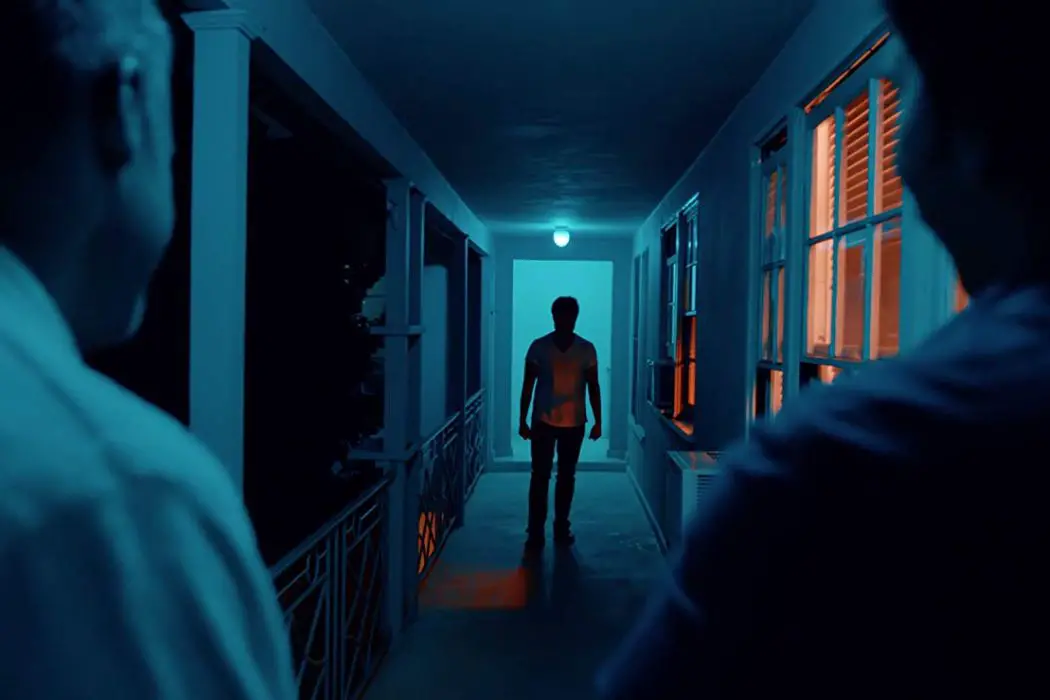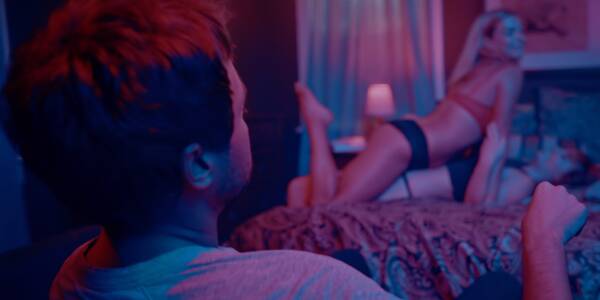High Stakes Independent Filmmaking With PHILOPHOBIA: OR THE FEAR OF FALLING IN LOVE

23year-old multi-award winning filmmaker and writer from the UK, a…
The world of filmmaking seems simple enough from the view of an audience, while Twitter stans are crying out for Ryan Gosling to make a film, who knows if he already has? But maybe, that film isn’t quite ready to be released to the world yet, maybe he’s shot three or four films, stacked up and ready for release come 2021. The truth is, the film industry works mostly in secrecy, simply because making a film is so long and difficult, that for about 90% of its childhood, it spends its time moping in the dark, unbeknown to audiences.
With all that in mind, breaking into the industry and making a film on an independent budget can be one wild ride, it can strip everything away from you, your house, your job, and your life. Then before you know it, you’re sleeping on your friend’s couch and the film you’ve slaved on is only just now ready for an audience to see. This is exactly the story of Tyler Nilson, director of this year’s indie hit, The Peanut Butter Falcon, starring Zack Gottsagen and Shia Labeouf, the Sundance flick racked up almost $20 million at the box office this year and, the it’s very similar to the story of Philophobia: or the Fear of Falling in Love director, Tyler Cole.
After three years of crowdfunding, selling all his belongings and getting an ARRI tattoo, Philophobia: or the Fear of Falling in Love was finished and picked up by Gravitas Ventures. Only after all that did Tyler Cole email me a screener for his first feature film.
Philophobia: or the Fear of Falling in Love
The story follows mildly successful podcaster, Damien Booster, digging his bachelor lifestyle until a frequent hookup confesses her love for him while delivering an ultimatum. It’s by no means perfect, entangled with its own specific issues that pertained to its choice of genre mixing. Nevertheless, I had a good time watching this film, it genuinely made me laugh, it engaged me at times and some characters were a joy to watch on screen.
I still find myself thinking about it’s hilarious and heartwarming performances from the supporting characters. Specifically, David Lengel as Alan, Carly Reeves as Nancy and Darren Keefe Reiher as Travis. Each chew up the screen, especially, Lengel as Damien’s best friend on a trip to LA, who’s lovable, charming and consistently convincing. The film’s strong points are arguably the most important aspects of any good film. Its screenplay, editing and its cast, which makes any scene with characters sitting and talking to each other more entertaining than it should be – especially when it decides to take its time.

The flaws lay simply in the film’s tricky balance of comedy and horror, the script sometimes blends a naturalistic tone and seduces you until it’s tripped up by having to bring in further elements of horror, it’s a fickle process trying to portray it on screen. Especially when the chemistry makes the comedy and drama, fluid and natural, tense moments appear too often or fail to be precise enough, eventually aiding a flaw that brings down most independent horrors. While the lighting begins slightly too harsh and powerful, it slowly gives way to natural elements that help balance the aesthetic across the film’s timeline. The theme is here, when we get into it and everything flows more naturally, Philophobia has aspects of top-notch indie filmmaking, unfortunately, it falls into traps set by itself by deciding to lean heavily into genre at times. Occasionally, it’s executed well but still feels like a mushy mashy tone for its run time.
I’d be interested in seeing what this team does next, but I’d like it to be more reserved and lean into itself. Sitting on the back of its tone instead of chosen genres. Essentially, Philophobia: or the Fear of Falling in Love, is strong work, a piece that’s genuinely fun to watch with some special character moments sprinkled in between, when it slopes toward horror cliche, the momentum stalls and falls a couple of paces behind something that could be have been unique and special dramatic comedy.
In conversation with director/editor Tyler Cole and writer/actor Aaron Burt
Levi Aluede for Film Inquiry: Where did the initial idea of the screenplay come from? Moreover, when did the idea to blend horror into comedy step in?
Aaron Burt: I think the script came to mind around 2012 or 2013 when I was in a period where I questioned my own emotional well being. I felt like something was broken in me. I felt I didn’t have blood pumping to my romantic center at this stage of my life. Turns out I just had a protective block and in that period, I stumbled upon the term Philophobia. I thought, how interesting is it that as a society, we have a fear for everything and what an interesting idea to take that legit fear and make it very literal but in an “obvious fear” way. I.e. more tangible to an audience than an emotional breakdown.
As far as the comedic aspect, I in no way intended to make it seem like I’m being insensitive to a possibly crushing emotional debilitation. But coming from the filmmaking point of view, I thought the only way to make this vulnerable as an outreach to an audience is by making it humorous. Because if I took my initial concept and committed solely to making it only scary, I don’t think it would translate well.

The cinematography is very striking and colorful, I noticed there’s mainly one lens being used, was this a creative choice or a limitation?
Tyler Cole: Thank you! The colorful cinematography was a creative choice because of its limitations. We only had one gaffer most days and so our DP, Tom Meredith, rigged Phillips Hue Bulbs throughout the apartment to amp up the lighting a little bit without having to spend too much time.
Our main lens was the ARRI Alura 30-80 Zoom lens and we had a prime 18mm for wide shots. We preferred the zoom lens in order to save time and make our days. Prior to the shooting, I sent our DP a mood/look book outlining the visual style we were looking for both inside the apartment as well as outside on the balcony. We brainstormed for a while to make sure we were able to accomplish the mood using the limited resources and time that we had.
My favorite aspect of the film are the sequences where characters simply sit down and talk to each other, which can be a big compliment in the world of filmmaking, how was it directing those, finding the natural humor and rhythm?
Tyler Cole: That is amazing to hear because those were the scenes I was most stressed about. I had never directed a tabletop scene with multiple characters talking over each other. As I was reading different articles from first time filmmakers, everyone kept talking about how hard those were to shoot and of course here I am on my first feature film where I have a couple of those scenes.
I am an editor too, so I edited the scene as best I could in my head prior to shooting. I blocked it out on paper and drew lines showing who was talking to who at any given time so I could establish which people needed to be in the same two-shot, which over the shoulder shots were absolutely necessary and which ones I could get away with not shooting. It was a process for sure but I think those scenes turned out great and I’m thrilled that those were some of your favorites. In terms of finding the natural humor, that credit all goes to the actors. They are so incredibly talented!
What can you say about the independent filmmaking process, that either audiences or young filmmakers won’t get to see or learn?
Tyler Cole: I quit my job, sold all of my things, and moved onto my friend’s couch. But I did so in order to create an opportunity for our company and to make a calling card feature film in an attempt to launch our careers. The thing about independent filmmaking that I think most audiences and young filmmakers don’t see, is the amount of hustle needed to actually finish. You see so many people make both short and feature-length films and never finish them. It’s HARD. By far the hardest thing I’ve ever done. There’s no guarantee that after three years or more of the hardest work you’ve ever done, that anyone will even like the film or that you’ll even get out of the personal debt you’ve put yourself into. High risk, high reward. On top of all of that, you need a team of talented people who trust you and are willing to help for little to no money. I wouldn’t want to do anything else, you have to love it more than anything or you’ll never make it through to the other side.
Aaron Burt: I think with the budget we had, not only was it consuming from a creative place but also in a day to day workflow. Every day is a task and asking for help has become a full-time job even still after the movie has been finished for almost a year. We are still working on it and still asking for help. It’s also creatively stinting because you can’t really move on. You can’t fully allow an open creative mind because you haven’t let go of the film, it won’t stop. Independent films like this one are all us or nothing.
Philophobia: or the Fear of Falling in Love releases digitally on iTunes and on Blu-Ray come November 12, 2019.
https://www.youtube.com/watch?v=z9Gdfu8wO4U
Does content like this matter to you?
Become a Member and support film journalism. Unlock access to all of Film Inquiry`s great articles. Join a community of like-minded readers who are passionate about cinema - get access to our private members Network, give back to independent filmmakers, and more.













